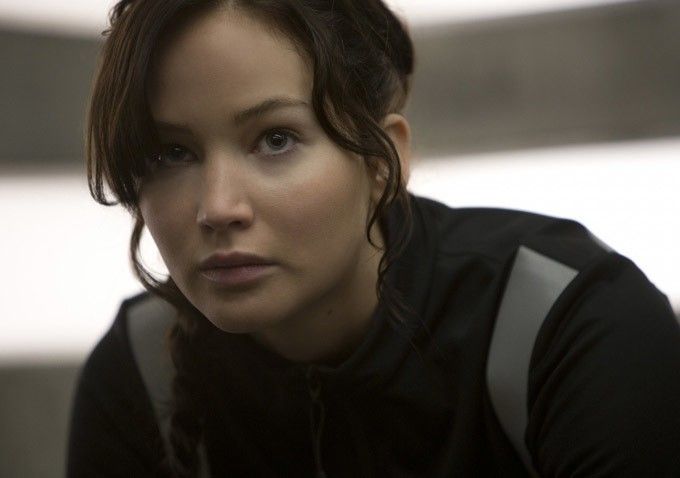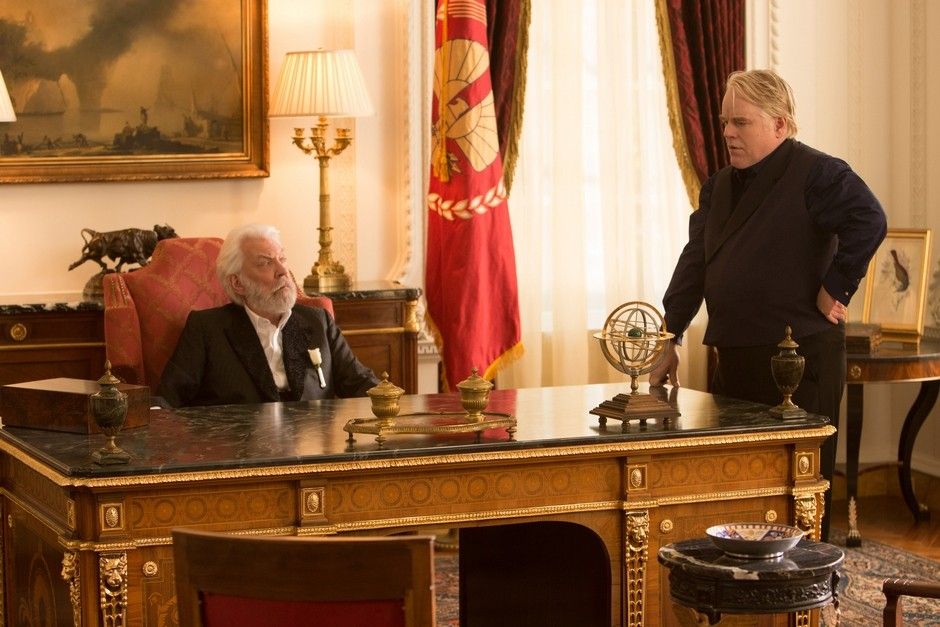It’s rare that a sequel surpasses its predecessor, but in the case of the Hunger Games series, many critics believe Catching Fire has done just that. You won’t find the same sentiment in this review, but that doesn’t mean director Francis Lawrence’s Catching Fire isn’t entertaining.
The Lionsgate sequel begins as Katniss Everdeen (Oscar winner Jennifer Lawrence), co-winner of the 74th annual Hunger Games, hunts in the woods with her old friend (and maybe more) Gale (Liam Hemsworth). But her aim isn't as true as it once was. Katniss remains haunted by her time in the Games, and fears what the Capitol will do to her loved ones if she can't convince the public at large that she's truly, madly and deeply in love with her fellow winner Peeta Mellark (Josh Hutcherson). President Snow (Donald Sutherland), Panem's ruthless kingpin, drops in on Katniss' home to punctuate her fears: If she can’t convince him of her love for Peeta during the upcoming Victory Tour (a series of self-congratulatory, media-friendly visits to the 12 Districts of Panem), then everyone and everything that Katniss loves will fall to ash.
Katniss' fear, not for her life but for the lives of her loved ones, is what drives most of the movie. It's not until nearly halfway through the proceedings that the threat of the Games itself comes into deadly focus. That's not a complaint, either. Some of the film's best moments occur in the first act, as Katniss realizes just how much she defied the Capitol when she outplayed the Games, that she can't stop the fire she started, and that the backdraft could very well consume all she holds dear.
Lawrence owns Katniss Everdeen. The character lives in the hearts and minds of every reader of the books and fan of the films, but it's her role to command. She plays Katniss with steely focus and stone-cold purpose, but not without empathy for the thousands of other individuals suffering at the hands of the cruel Capitol. Lawrence invests the part with enough power and conviction that you understand why the masses are rallying around her as an icon against oppression.
Lawrence is so effective as Katniss that her co-leads Hutcherson and Hemsworth pale in comparison. Both actors are fine in their roles, but not much more than that. It's not an overwhelming issue, given how much rests on Lawrence's shoulders, but much of the story hinges on Katniss' feelings toward both Peeta and Gale. It's hard to follow her struggle when neither choice is compelling.
Sam Claflin as newcomer Finnick Odair, previous winner of the Hunger Games, is another story: As one of the novels' most beloved characters, Finnick's translation from the page to the screen is one of the most anticipated aspects of Catching Fire. Claflin doesn't disappoint. He's brash and showy in his first few scenes, almost repellingly so, but he eases into the character's softer side just as the story demands it. Both Claflin the actor and Finnick the character use arrogance and levity to mask a wounded heart and a noble soul. It's a great performance, one of the best of the new players.
Likewise, Jena Malone delivers as Johanna Mason, another fan-favorite from Suzanne Collins’ novels. Johanna isn't an easy nut to crack: If played too far one way, she could come off as sassy and sexy without substance; if played too far in the other direction, she'd become too cold. Malone takes the character right on the line, making her alluring and attractive and warm without losing her killer instinct and righteous indignation against the Capitol.
In addition to new characters, Catching Fire unveils a new take on the titular tournament. Catching Fire takes place during the 75th anniversary of the first Hunger Games, and as such, the latest iteration of the competition boasts a unique twist (think regular Survivor versus Survivor: All-Stars.) The arena features some surprises as well, with the exact nature of the playing field serving as one of the final act's central mysteries. It's hard to talk too much about the Games and the arena without spoiling things for fans who haven't read the novels. It's enough to say that the twists work very well.
But it doesn't all work. Catching Fire presents some great new main characters, but doesn't hit the mark on many of the supporting players. Phillip Seymour Hoffman plays Head Gamemaker Plutarch Heavensbee as straight as humanly possible. There's no weirdness, no flair to the character, as seen in Elizabeth Banks as Effie, Woody Harrelson as Haymitch or Stanley Tucci as Caesar Flickerman. It's just PSH being PSH. No harm, no foul — but no home run, either.
Jeffrey Wright as Beetee suffers from a different problem; the performance sings, but the script doesn't invest in his wonderfully weird character. The same can be said for the deadly Careers and third-string Tributes populating the arena. The first Hunger Games found some spark of heart and personality in each of the speaking-part Tributes, but the "antagonists" in the Catching Fire arena are, by and large, Red Shirts.
In fairness, those problems – and more -- exist in the novel, the second book in Collins’ Hunger Games series. Some of them are in the movie, but many are left out wholesale. The screenplay by Simon Beaufoy and Michael Arndt cuts a lot of the book's fat, and that approach works most of the time. But you're left wanting a little bit more from the film's supporting cast.
The other major issue with Catching Fire is that it feels like part of something greater, more than it feels like its own unique entity. Katniss' story could have ended with The Hunger Games, without any sequels, without any elaboration, and it would still stand as a great piece of work. That's not the case with Catching Fire. The conclusion demands continuation. Of course, there are two more movies on the way; the third novel, Mockingjay, will be adapted as two movies over the next two years. It's important to set up the rest of the series, especially as the story becomes more serialized and less inclusive for franchise newcomers, but that doesn't mean Catching Fire shouldn't have its own sense of closure, completely separate from any other preceding or upcoming movie. It does not have that.
Still, overall, Catching Fire works. It sings louder than the source material. It's bright at turns, bleak at others, and blood flows all throughout. It's a worthy follow-up to The Hunger Games. It's not a better movie, but it's a matter of inches, not miles. Like its predecessor, Catching Fire is thrilling and thoughtful, a happy reminder of what the modern-day blockbuster can and should be.
The Hunger Games: Catching Fire opens Friday nationwide.


